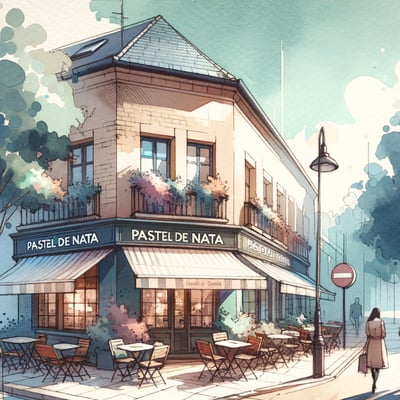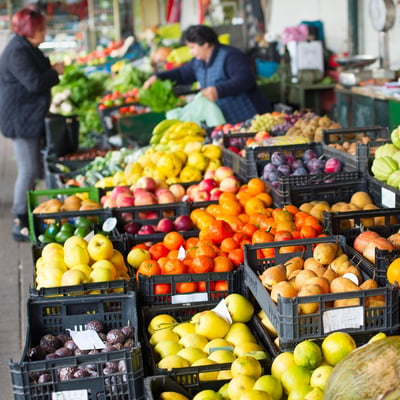1
00:00:03,288 –> 00:00:06,228
Débora: Então, como é que vais passar o teu aniversário?
{{Débora: So, how are you going to spend your birthday?}}
2
00:00:06,748 –> 00:00:09,808
Afonso: Vou passá-lo com a minha família e com os meus amigos.
{{Afonso: I’m going to spend it with my family and with my friends.}}
3
00:00:10,408 –> 00:00:12,111
Débora: Que bom! Tiraste o dia?
{{Débora: How nice! Did you take the day [off]?}}
4
00:00:12,618 –> 00:00:16,473
Afonso: Sim, pedi folga. É a primeira vez em anos…
{{Afonso: Yes, I asked for the day off. It’s the first time in years…}}
5
00:00:17,068 –> 00:00:23,938
Débora: Acho que fizeste muito bem. É um dia especial, deves passá-lo com os teus. Vão almoçar na casa da tua mãe?
{{Débora: I think you did very well. It’s a special day, you should spend it with your loved ones. Are you having lunch at your mother’s?}}
6
00:00:24,458 –> 00:00:26,513
Afonso: Não, almoçamos na minha casa.
{{Afonso: No, we’re having lunch at my house.}}
7
00:00:27,148 –> 00:00:33,507
Mas eu pedi-lhe para ela fazer o assado dela e a minha irmã vai fazer a sua especialidade – o bolo de aniversário.
{{But I asked her to make her roast and my sister will make her specialty – the birthday cake.}}
8
00:00:34,028 –> 00:00:38,468
Débora: Já ouvi falar tantas vezes desse assado, qualquer dia vou ter de provar.
{{Débora: I’ve heard about that roast so many times, someday I’ll have to try it.}}
9
00:00:38,968 –> 00:00:40,141
Afonso: Porque é que não vens?
{{Afonso: Why don’t you come?}}
10
00:00:40,548 –> 00:00:43,163
Débora: Oh, não quero fazer-me de convidada.
{{Débora: Oh, I don’t want to crash the party (“make myself a guest”).}}
11
00:00:43,848 –> 00:00:46,653
Afonso: Nem pensar! Tenho todo o gosto que vás.
{{Afonso: No way! I’m glad you’re coming.}}
12
00:00:46,968 –> 00:00:48,698
Débora: Mas vai mais algum colega nosso?
{{Débora: But are any of our colleagues coming?}}
13
00:00:49,058 –> 00:00:54,548
Afonso: Não, mas não te preocupes com isso. A minha família e os meus amigos vão receber-te muito bem.
{{Afonso: No, but don’t worry about that. My family and friends will welcome you very well.}}
14
00:00:55,088 –> 00:01:00,579
Débora: Não tenho a menor dúvida. A vossa boa-disposição já é conhecida na cidade e arredores!
{{Débora: I don’t have the slightest doubt. Your good disposition is already [well-]known in the city and its surroundings!}}
15
00:01:01,168 –> 00:01:04,579
Afonso: Que exagero! Então, conto contigo?
{{Afonso: What an exaggeration! So, [can] I count on you?}}
16
00:01:05,098 –> 00:01:05,958
Débora: Claro que sim!
{{Débora: Of course!}}
17
00:01:06,528 –> 00:01:08,019
Afonso: Que bom! Vais gostar!
{{Afonso: How nice! You’ll like it!}}
18
00:01:08,718 –> 00:01:13,508
Débora: Tenho a certeza que sim. Queres que leve alguma coisa? O meu arroz-doce?
{{Débora: I’m sure I will. Do you want me to take something? My rice pudding?}}
19
00:01:14,048 –> 00:01:17,428
Afonso: Não te importas? Sabes que eu adoro o teu arroz-doce!
{{Afonso: You don’t mind? You know I love your rice pudding!}}
20
00:01:17,838 –> 00:01:19,057
Débora: Não me importo nada!
{{Débora: I don’t mind at all!}}
21
00:01:19,468 –> 00:01:23,458
Afonso: Vai ser um sucesso! Os meus amigos são uns gulosos.
{{Afonso: It’ll be a success! My friends have such a sweet tooth.}}
22
00:01:24,098 –> 00:01:27,657
Débora: E por falar nos teus amigos… há algum solteiro?
{{Débora: And speaking of your friends… are there any single [ones]?}}
23
00:01:28,228 –> 00:01:33,598
Afonso: Olha, agora que falas nisso… o meu amigo António. Acho que vais gostar dele.
{{Afonso: Look, now that you mention it… my friend António. I think you’ll like him.}}
24
00:01:34,128 –> 00:01:35,583
Débora: Ai, eu estava a brincar!
{{Débora: Oh, I was kidding!}}
25
00:01:36,008 –> 00:01:37,055
Afonso: Brinca, brinca…
{{Afonso: Keep joking…}}

 Natacha
Natacha Pedro
Pedro











Me gusts el dialogo
I think this will help me
por falar em= speaking of, say of, talk about
At 006 sec, he says “Vou passá-lo…..” I would have thought it should be ‘passar-lo’? Is this simply a contraction for pronounciation or have I missed something?
Olá, Leonard. It’s not a pronunciation quirk, it’s really a rule 🙂
When we have the object pronoun “o” after a verb form that ends in a consonant, there’s a grammatical rule that says that the preceding consonant must be dropped and the o” must change to “lo”. So, we go from “passar-o” to “passa-lo”. Finally, to keep the stress on the last syllable, we have to add the accent as well: “passá-lo” (otherwise, without accent, we’d naturally stress the first syllable instead).
Here’s a Learning Note on this: Clitic Pronouns: 3rd Person
In this part:
“Nem pensar! Tenho todo o gosto que vás.”
(No way! I’m glad you’re coming.)
Is it “vás” instead of “venhas”?
Both “vás” and “venhas” could potentially be used, as they are both present subjunctive forms of the verbs “ir” (to go) and “vir” (to come), respectively. The choice between “vás” and “venhas” in this context makes no difference.
– “Tenho todo o gosto que vás.” implies that Afonso is pleased about Débora’s decision to go to his birthday party.
– “Tenho todo o gosto que venhas.” would imply Afonso is glad that Débora is coming, suggesting a movement towards the event location.
I’d say that in this context “vás” is the more common way of phrasing it in European Portuguese, even though “venhas” is also correct and common, specially if the person saying it is at the location where the event is being held – which wasn’t the case here.
However, in English, “I’m glad you’re coming” is the most common way of phrasing it, regardless where the speaker is, since Afonso is talking about his birthday plans.
🙂